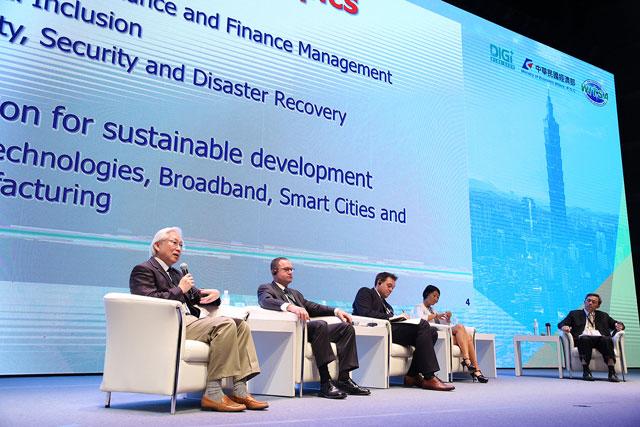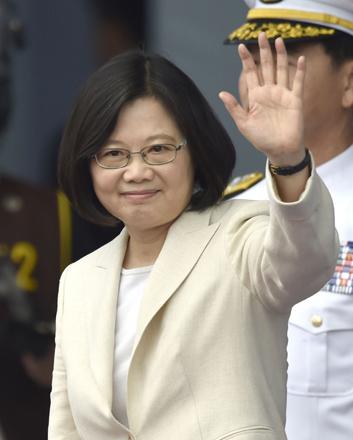You are here
Taiwan moves towards developing software
By Mohammad Ghazal - Sep 18,2017 - Last updated at Sep 18,2017

Officials and experts discuss the latest technological advancements at the World Congress on Information Technology in Taipei recently (Photo courtesy of Taiwan foreign ministry)
TAIPEI — Amidst rapidly growing developments in the field of information technology, Taiwan is shifting its focus to software innovation and digital applications, moving beyond the hardware production.
Speaking during the 2017 World Congress on Information Technology (WCIT) that took place in Taipei recently, Taiwanese officials looked into challenges and opportunities the sector faces, while announcing a series of schemes to strengthen Taiwan's presence in the field of software and digital application, which are seen as the future of the field.
Taiwan is keen on creating closer cooperative relationships with countries throughout Asia regarding smart applications and digital economies, President of Taiwan Tsai Ing-wen said at the opening of the WCIT, which attracted experts from more than 80 countries as well as 250 start-ups in the sector.
With eyes focused on transformation towards the digital economy and digital applications, she said the Taiwanese government has been liberalising laws and regulations, and promoting industrial innovation programmes such as our Asia Silicon Valley programme.
"We also have a Digital Nation and Innovative Economic Development Plan called DIGI-plus to upgrade our digital infrastructure, with a special budget to accelerate implementation" said the president. The DIGI-Plus is a 2017-2025 programme for developing a digital country and innovation economy to reinforce digital infrastructure.
President Tsai expressed confidence that completing these projects will help make government more efficient, upgrade industry, bridge the urban-rural divide, and raise overall quality of life. And she believes that these advances will help Taiwan leave old industrial models behind, and gradually become a benchmark country for digital economy.
"Taiwan is now moving from contract hardware manufacturing into innovative smart applications. Taiwan welcomes outstanding personnel and enterprises involved in the Internet of Things, Industry 4.0, and Artificial Intelligence to connect with our domestic supply chains, and develop innovative digital products and application services. Second, the Taiwanese government will provide sufficient resources so that the younger generation can fulfill their digital dreams. "A key task for my administration is to create an industrial innovation-friendly institutional environment," she said.
In a meeting with Digital Minister without Portfolio Audrey Tang on the sidelines of the conference, the minister said Taiwan was known for semiconductors, peripherals and all kind of hardware manufacturing.
"But we are now also changing in our own value chain, driven by technologies such as artificial intelligence on the edge, Internet of Things etc., which all require us to move closer to the user and closer to design and to user needs," said Tang.
Stressing the importance of upgrading curricula in the journey towards transformation and focus on the software and digital application, the minister said work is under way in Taiwan to upgrade the curricula with focus on "what we call literacies or the building of characters. The three main characters are autonomy, interaction, and the common good".
"The idea is for the new curriculum to build up a generation who just think about their social missions, think about what common good they can bring to the world, or whatever self-fulfillment they want to make, while making others no worse. The idea is that whatever task they learn along the way is discoverable. If this gets automated, that's great, because they can focus on the higher values," said the minister, stressing on Taiwan's eagerness to share expertise with other countries in these areas.
In a meeting with the press during the conference, Minister without Portfolio Wu Cheng-chung said the future of Taiwan lies in the field of digital applications and software.
"We have launched key schemes for this transformation and are working on several fronts whether in legislation or regulation or via support extended to startups," said Chung.
"There is more focus on the internet of things, Big Data, artificial intelligence and all digital apps," said Chung.
Officials during the event stressed on keenness for increased cooperation with countries in Asia and the Middle East including Jordan, especially in the field of supporting and incubating startups and software development.
At the opening of the event, World Information Technology And Services Alliance Chairman Chiu Yueh-Hsiang stated that technology has become a vital part of every aspect of our lives including communication, education, manufacturing, medical cares, transportation, urban development, and resource management.
The purpose of WCIT is to facilitate communication between different countries and enhance the application of IOC. By connecting the dots together, "we will be able to achieve a prosperous future".
Related Articles
TAIPEI — Taiwan’s new president, Tsai Ing-wen, was sworn in on Friday, pledging to focus on internal reforms and expressing willingness to “
TAIPEI — Taiwanese President Tsai Ing-wen vowed Saturday to maintain peace and stability across the Taiwan Strait in the face of increased m
BEIJING — China on Wednesday vowed zero tolerance for "separatist activities" in Taiwan and reaffirmed that it would take the self-ruled isl

















